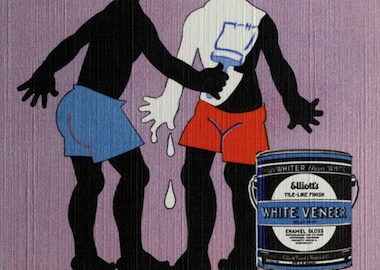Professor Anthea Butler has caught much flack recently for arguing in a post here on RD that the George Zimmerman verdict exposes that a god-complex, tied to and articulated as white supremacy, remains powerfully at work within U.S. society. She’s right, of course. In putting on the table the question of how religion relates to the verdict, how religion has been operative under the radar, so to speak, inside of the verdict, and how religion is the larger horizon of the shooting and subsequent trial, Dr. Butler has done us all a profound service.
But as a theologian or a Christian intellectual, I want to up the ante on her provocative and important analysis and propose that the only moral, ethical, and religious response worth its salt to the Zimmerman verdict is to be atheist.
Now before you shut me down, hear me out.
On that fateful night a year and a half ago, George Zimmerman did not see Trayvon Martin, the human being. He did not see Trayvon Martin, a young, 17-year-old child on his way home from the convenience store with Skittles and a soft-drink and talking on his cell phone with his friend. Instead, all that Zimmerman could see was a hooded threat. And so, he deputized himself to be the police, and in that capacity shot Trayvon Martin dead.
But more than just deputizing himself to act with police power (and this is the crucial point of Dr. Butler’s reflections), he deputized himself to stand in the place of god, to act in god’s name and with divine or sovereign power (remember Zimmerman’s words to Sean Hannity that shooting Trayvon Martin was “God’s will”), and finally, not just to act as god but to be a god, a god who could judge and act with the power of life and death—or more accurately, with the power of death and under the protection of law.
But who is this god in whose name Zimmerman acted under the cover of law on that dusky Florida night? This is the question Dr. Butler rightly—and to the discomfort of many—is raising. Her answer: it’s the “American god,” who is nothing less than “a white racist god . . . carrying a gun and stalking young black men.”
This edgy reference to a “white racist god,” drawn from Dr. William R. Jones’s book Is God a White Racist?, is what seems to have stuck in some people’s craw and found its way into much of the conservative media. What could such a phrase mean? As my colleague Professor Willie James Jennings outlines beautifully in a recent follow up piece, this book, written in 1973 in the wake of the social transformations of the 1960s, forces a question back upon the intellectuals of the black theology project—particularly back upon Dr. James Hal Cone and Dr. Deotis Roberts.
Dr. Jones raised what in the history of philosophy and theology has come to be called the “theodicy” question: How do we hold onto God’s goodness in the face of ongoing suffering, suffering that God should be able to stop but doesn’t stop? What does it mean that God doesn’t stop suffering, though God is supposed to be good? There’s only one conclusion: in Dr. Butler’s words, “God ain’t good all the time.”
Where is God for Trayvon Martin and his family? Where is the goodness and justice of God for Marissa Alexander, the African-American woman who is presently serving a 20-year prison sentence for shooting a warning shot to ward off her abusive husband from attacking her? She “stood her ground,” shoots and kills no one, but gets 20 years in prison (we’re still waiting to see if Florida’s governor will commute her sentence or if this will remain a travesty of justice); Zimmerman shoots and in fact kills Trayvon Martin and is acquitted.
While neither of these cases was legally argued under the “Stand Your Ground” statute, they both were operating in a “Stand Your Ground” cultural context that cannot be uncoupled from race. Indeed, juror B37’s comments in her interview with CNN’s Anderson Cooper reveals that “Stand Your Ground,” if not legally then certainly culturally, was operative in her deliberations to support her exoneration of Zimmerman. The cases of Marissa Alexander and George Zimmerman, both individually and together, force the question: Where is liberation in this and where is the good God?
This is Dr. Butler’s question. But there’s also an implied question here that I’m trying to smoke out and that Dr. Jennings was trying to get at as well. Who is the god behind U.S. society; behind its system of laws, behind a criminal justice system that in effect tried Trayvon Martin from the grave for his own murder and found him guilty even as it found Zimmerman not guilty? Who is the god that stands religiously and symbolically behind the historic association of blackness—and especially black men—with criminality. Toni Morrison talked about this in a different context but her words echo powerfully here: “Blackness and criminality are merged in the minds of most white Americans.”
In forcing these uncomfortable questions on us, Professor Butler is saying that we must reckon with the legal, social, historical, and finally the religious, entanglements of Christianity with whiteness. So entwined has the racial imagination, the imaginary of whiteness, become with Christianity in the religious underwriting of U.S. society that the question is no longer the question Why god? It is now, Which god? Which god is being talked about and enacted when the word “god” is invoked? Which god was Zimmerman invoking to Sean Hannity?
Dr. Butler’s answer, with which I agree, is clear. The Zimmerman acquittal exposed the workings and the crushing weight of the “American god” (to be distinguished from God with a capital “G”) on black bodies.
Whiteness is Not About Being White
And now to up the ante. If Dr. Butler is right that the Zimmerman acquittal displays a particular kind of god, the “American god,” then the only response to the problem of (this) god is atheism.
I’m not talking about the atheism of the likes of Richard Dawkins, Daniel Dennett, or the late Christopher Hitchens. The atheism I’m talking about entails social, political, and intellectual struggle, not against some god-in-the-abstract, but rather against a specific or particular god: the “American god.” What I hear in Dr. Butler’s term the “American god”—and what, I think, we all must hear—is not a condemnation of America as such, but rather the courage to name its idolatries so that we can be a different, more just United States of America, “not a perfect, but a more perfect union,” as President Barack Obama said last week in his most poignant comments to-date on race in America.
And just as we cannot talk about god-in-the-abstract, nor can we speak of idolatry-in-the-abstract. The white, western god-man is an idol that seeks to determine what is normal. It is a norm by which society governs the body politic or regulates, measures, evaluates, and indeed judges what is proper or improper, what is acceptable or suspicious citizenship. It is this idol, the idol of the “American god,” that is the symbolic figure Zimmerman identified himself with and in relationship to which he judged Trayvon Martin as, in effect, religiously wanting—wanting in proper citizenship, and ultimately wanting in humanity.
That Zimmerman is Latino should not distract us, for in fact it reinforces the point inasmuch as whiteness (and therefore the notion of the white, western god-man at its heart) is not a biological notion; it is narrative or a story, which is what Professor Brian Bantum was getting at in his commentary on the Zimmerman verdict. Whiteness is that story that one must aspire toward if one is to be deemed a proper citizen, a proper American. Rather than being biological, then, whiteness is better understood as a kind of discipline, something one must be disciplined into and thus something one must achieve and continually accomplish within oneself.
Understood in this way whiteness is a story of assimilation, a story that hails or calls out to us—especially to immigrant families. It awaits our answer to its call and through our answers (which can take the form of everyday practices like neighborhood watching, for example) we establish ourselves inside of or relate ourselves to the narrative of the proper citizen, to proper Americanness. Indeed, immigrant history in this country is the (very often violent) history of the achievement for some (and the failed achievement for others) of assimilation into the national narrative of the proper citizen.
This is the broader matrix for understanding Zimmerman as Latino and his profiling or policing of Trayvon Martin. On that fateful night, between George Zimmerman and Trayvon Martin stood the ghost of whiteness, the narrative of proper or improper Americanness, or the specter of the “American god,” whose “will” Zimmerman saw himself as carrying out in protecting his neighborhood from the suspicious citizen or the out-of-place, hoodie-wearing “black boy,” to use that loaded phrase of the African-American writer Richard Wright.
We must struggle against this “American god” or the idol of the white, western god-man. Indeed, we must struggle against this god with an eye toward a different social order and under the realization that things don’t have to be this way—and that they must change.
What I’m in effect calling for is a Christianity uncoupled from this nation-state project, from the project of social purity or “proper” Americanness, with its (racially inflected) legal protocols and its vision of racialized criminality and institutions of incarceration. I’m calling for a Christianity that no longer provides religious sanction or the cloak of righteousness to the political project of U.S. sovereignty and its vision of who is normal (and in the right place) and who is abnormal (and thus out of place). I’m calling for a Christianity whose animating logic is no longer tied to that false “god-man.” The “god” of (or that is) whiteness is a god toward which we must be thoroughgoing atheists and religionless.
If Christianity in this country and in our times is to have a future, it must be a Christianity beyond (the reigning) Christianity (and its god of anti-blackness). It must be a Christianity no longer centered in a normalizing whiteness. It must be a Christianity of a Not-Yet social order that is emerging right now in our midst (which is why there’s so much racial backlash in our so-called “postracial” moment).
It will be a Christianity of that “terrible beauty” that Professor Imani Perry speaks of in her improvisation on James Baldwin. In short, what is needed is a Christian atheism, a Christianity-after-Christianity, a Christianity beyond itself, a Christianity that plays out on the ground as struggle, that in fact is struggle under what Édouard Glissant, when crossing the Atlantic aboard the Queen Mary, called “the consent not to be a single being,” to be more than one.
For it may be that struggle in solidarity with others, the struggle to be for and with others, the struggle of the multitude, the struggle that is blackness, is the new ecclesiology. This is the struggle to get rid of these “Stand Your Ground” laws that are in place in many states besides Florida, struggle against state legislatures (such as North Carolina’s) that are enacting draconian laws of various sorts, struggle in the name of the protection of women’s agency about their own bodies—in short, struggle to imagine a new politics of social belonging, or what Dietrich Bonhoeffer once called “life together.”
Christian atheism: This is the only moral, ethical, and alas Christian response worth its salt to the Zimmerman verdict.





